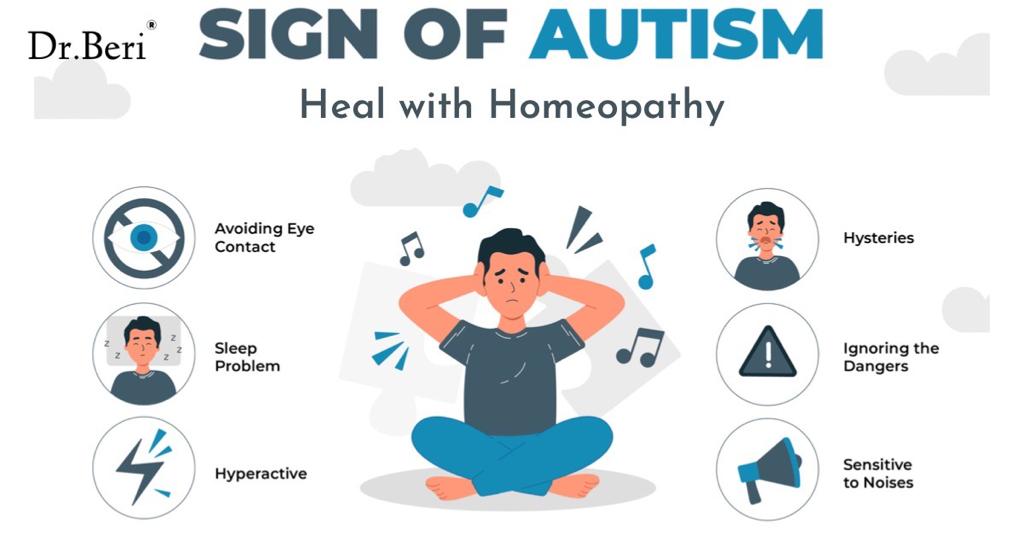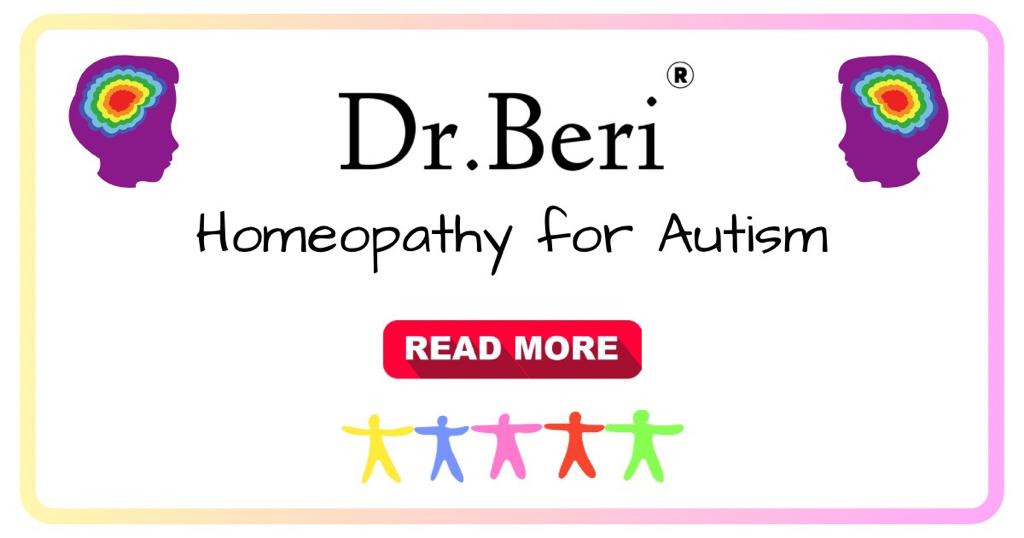Autism refers to a group of complex conditions known as Autism Spectrum Disorders (ASD). It’s called a spectrum because there is a wide range of ways it can affect people. Autism Spectrum Disorders (ASD) is a neurodevelopmental disorder that impacts brain development, leading to challenges in social skills, communication, and behavior patterns. Understanding the spectrum nature of ASD is crucial, as it manifests differently in each person. However, with proper support and interventions, individuals with ASD can acquire skills to lead meaningful lives.
In this article, we will explore the best homeopathic medicines for autism, providing effective treatment options. By taking a holistic approach, homeopathy offers promising solutions that address the unique needs of individuals with autism, providing hope for improved quality of life. Let’s explore the best homeopathic medicines and treatment options available for those seeking alternative approaches to autism care.
What is Autism Spectrum Disorder?
Autism Spectrum Disorder (ASD) is a condition that affects how people interact and communicate. It is usually noticed when children are around 2-3 years old.
It’s important to understand that no two people with autism are exactly alike. Autism affects individuals in different ways, although there are common areas of difficulty. Based on these differences and the severity of symptoms, ASD is divided into three types:
- Classic Autism: This is the type of autism that most people think of when they hear the term. It involves significant challenges with language, communication, and social skills. Milestones, such as speech development, may be delayed, but many individuals with classic autism have normal intelligence.
- Asperger Syndrome: Asperger Syndrome is a milder form of autism. The main difference between Asperger Syndrome and classic autism is that individuals with Asperger Syndrome typically have normal language and cognitive abilities. However, they still experience significant difficulties in social interaction and non-verbal communication.
- Pervasive Developmental Disorder-Not Otherwise Specified (PDD-NOS): This is sometimes called “Atypical Autism” and is diagnosed when someone doesn’t fit neatly into the categories of classic autism or Asperger Syndrome.
To Know More About Atypical Autism from Crossrivertherapy
Signs to Look Out for in Autism


- Lack of Smiling: Not responding with a smile to joyful expressions by 6 months of age or later.
- Limited Facial Expressions: Absence of facial expressions by 9 months, such as not showing emotions through facial movements.
- Delayed Babbling: Not engaging in babbling sounds by 12 months, which are the early vocalizations babies typically make.
- Lack of Gestures: Not pointing, showing, reaching for objects, or waving by 12 months, which are important non-verbal communication skills.
- Delayed Speech: No meaningful words spoken by 16 months, indicating a delay in expressive language development.
- Lack of Phrases: Inability to speak meaningful, two-word phrases (excluding imitating or repeating) by 24 months.
- Regression: Any sudden loss of previously acquired speech, babbling, or social skills at any age, which is a significant change in development.
These signs may serve as red flags for potential autism-related concerns. If you notice these behaviors in a child, it is advisable to consult with Dr Beri for further evaluation and guidance. Early identification and intervention can make a positive difference in the lives of individuals with autism.
Best way to help a child with Autism
Autism is a highly individualized disease, and the mode of treatment for each autistic patient is slightly different than the rest.
Play Therapy: Nurturing Development through Play in Autism
Play therapy is a powerful approach that harnesses the natural process of play to facilitate learning and growth. For children with autism, who may tend to play alone and engage in repetitive behaviors, play therapy offers a valuable opportunity to develop social interaction and communication skills.
The primary aim of play therapy is to support children in expanding their ability to engage in imaginative and creative play. By encouraging novel activities and fostering symbolic play, therapists help children with autism broaden their repertoire of play behaviors. Through playful interactions, children can develop and refine their social and communication skills in a safe and supportive environment.
Speech Therapy: Communication in Autism
For children with autism who experience challenges with speech and language skills, speech therapy offers a vital pathway to enhance their ability to communicate effectively. While speech therapy encompasses a broad range of techniques and interventions, there are aspects of it that parents can incorporate with relative ease and minimal training.
The primary objective of speech therapy is to support children in developing their speaking skills, as well as enhancing nonverbal communication abilities. Speech therapists work closely with children to improve their articulation, pronunciation, and overall verbal expression. Additionally, they focus on augmentative and alternative communication methods, including signs, gestures, picture systems, or electronic devices that facilitate communication.
Applied Behavior Analysis: Simple Steps in Autism
Applied Behavior Analysis (ABA) is widely recognized as a highly effective therapy for autism. With specific and measurable goals, ABA therapists excel in teaching new skills. While formal training is available, you can also apply ABA techniques in your home with some basic understanding.
Here’s a simplified approach to using ABA principles:
- Choose a skill you want to teach (e.g., brushing teeth).
- Break the skill into small, manageable steps (e.g., find toothbrush, wet it).
- Show the first step to your child, providing hands-on guidance if needed. Once they understand, ask them to do it independently.
- Praise and reward your child for their effort, using a small treat as motivation. If they don’t comply, ask again and repeat the training if necessary.
- Once your child masters the first step, move on to the next step.
- If your child needs help connecting the steps (chaining), provide a visual aid, such as a chart with the sequential steps.
By applying these straightforward principles, you can incorporate ABA techniques to teach new skills and promote positive behavior. Remember, consistency and repetition are key to reinforcement learning and helping your child succeed.
Empowering Parents of Autistic Children to Thrive
- Embrace and Love: Embrace and love the autistic child just as you would anyone else, celebrating their unique qualities and strengths.
Create a Supportive Environment: Strive to meet the needs of the autistic child while fostering a sense of normalcy in their daily life, encouraging inclusion and participation in everyday activities.
Practice Patience: Approach interactions with the autistic person with patience and understanding. Recognize their intelligence and unique perspective, adapting communication to their individual needs and preferences. - Promote Acceptance: Avoid any feelings of embarrassment or negativity when interacting with autistic individuals. Embrace acceptance and understanding, as their sensitivity to emotions can influence their behavior and overall well-being. By embracing acceptance, creating a supportive environment, practicing patience, and promoting a sense of normalcy, we can build meaningful connections and contribute to the well-being and growth of individuals with autism.
- Providing Supportive Presence: Offer consistent support and companionship to autistic individuals, recognizing their social challenges and difficulties in communication. While they may possess intelligence, their social interactions can be complex, and they may benefit from understanding and patience.
- Moderating Television Exposure: Be mindful of television time, ensuring it is not excessive. Autistic individuals can be sensitive to sensory stimuli, and excessive exposure to bright colors and lights on television may trigger seizures or emotional outbursts. It is important to strike a balance and monitor their sensory experiences.
- Managing Challenging Behavior: Understand that autistic children may exhibit challenging behaviors such as tantrums, hitting, or biting. Rather than encouraging or punishing such behavior, provide patient explanations about why the behavior is inappropriate and help them develop alternative ways to express themselves.
Respecting Emotional Well-being: Avoid any form of humiliation or allowing others to humiliate autistic individuals. Though they may struggle to express their emotions, they are capable of feeling hurt, anger, and rejection. Treat them with empathy and respect, fostering an environment that supports their emotional well-being.
The Role of Homeopathy in Autism
Homeopathy has shown great promise in the treatment of autism, unlike other forms of treatment. Homeopathy takes a holistic approach to healing, considering the whole person, both physically and mentally. Instead of treating individual symptoms separately, homeopathy looks at the person as a whole and prescribes a remedy that matches their unique constitution and qualities.
The carefully selected homeopathic remedy works on a deeper level, affecting the mind, nerves, hormones, and even genes to bring about positive changes in individuals with autism. This comprehensive approach sets homeopathy apart and offers hope for those seeking alternative treatments for autism.
Seek Homeopathic Treatment for Autism Today! – Schedule Appointment Below
Best Homeopathic Medicines for Autism
Autism can pose unique challenges for individuals, but homeopathy offers a beacon of hope. While other therapeutic systems may fall short, homeopathy shows remarkable promise in making a significant difference in the lives of autistic children and adults.
It is, however, worthwhile to remember that self-medication is not recommended. Find relief through Dr. Beri’s expertise in homeopathy
Carcinosin
When it comes to children with autism who exhibit talents alongside obsessive, compulsive, and stubborn behaviors, Carcinosin emerges as a highly effective homeopathic medicine. It also addresses sleep-related issues and can help manage addictive disorders in these children.
Agaricus
Agaricus, offers significant support for children with autism who exhibit mental and physical awkwardness. It effectively addresses symptoms such as indifference, muttering, talking, shouting, or singing without responding to direct calls or questions. Additionally, Agaricus proves highly effective in managing involuntary jerking movements in these children when they are awake.
Baryta Carbonica
Baryta Carbonica, a highly useful homeopathic medicine, offers significant support for children with cognitive challenges, including weak memory and low IQ. It is particularly beneficial for children who exhibit shyness, lack confidence, and have an aversion to strangers, often hiding behind chairs. Additionally, Baryta Carbonica is well-suited for children with physical dwarfism and stunted growth, recurrent tonsillitis, and sensitivity to cold air and weather.
Tarentula
Tarentula, a highly useful homeopathic medicine, offers significant support for children with autism who exhibit hyperactivity, extreme restlessness, and a constant need for motion. It is particularly beneficial for children with sudden mood changes, aversion to company, and destructive behavior. Tarentula is often recommended when a child shows a fondness for bright colors, music, and dance.
A Holistic Approach to Autism Treatment with Dr. Beri
Dr. Beri takes a holistic approach to autism treatment in homeopathy, considering the unique needs and characteristics of each patient. They understand that autism is a complex condition that affects individuals in various ways. By thoroughly evaluating each case, Dr. Beri creates personalised treatment plans that address the specific symptoms and challenges faced by the patient.


N.K.B. Homeopathic Medical College & Hospital Kolkata
30 Years Experience
An experienced homeopathic practitioner, transforming lives for three decades with his compassionate care and holistic approach, bringing relief to countless patients.



